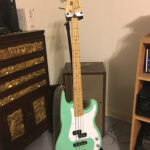Nashville tuning, also known as high-strung tuning, offers a unique and shimmering sound that can add a distinctive sparkle to your guitar playing, particularly in genres like country, folk, and rock. A common question among guitarists exploring this tuning is: what kind of guitar works best? Contrary to popular belief, guitar size isn’t the primary factor. The key lies in the guitar’s responsiveness to lighter gauge strings.
Responsiveness is Key: Build, Not Size
The most crucial aspect when selecting a guitar for Nashville tuning is its construction. Guitars built with a lighter touch in mind, often featuring more delicate bracing, are ideal. These instruments resonate beautifully with the lighter string gauges used in Nashville tuning. You might assume a larger guitar is necessary, but this isn’t necessarily true. Whether you have a dreadnought or a parlor guitar, the defining characteristic is how readily the guitar responds to a gentle touch and lighter strings.
Many factory-produced dreadnought guitars, including iconic models from Martin and Gibson, are often built with heavier bracing to withstand standard string gauges and higher tension. This robust construction, while excellent for standard tuning, can hinder the responsiveness needed for Nashville tuning. Smaller bodied factory guitars sometimes fare better due to their typically lighter builds, making them more naturally suited to this unique tuning. Ultimately, focus on the guitar’s overall build and how easily it vibrates, rather than just its dimensions or the wood it’s made from.
The “Extra Light Treble String” Test
Unsure if your guitar will sing in Nashville tuning? Here’s a simple test: string your guitar with just two extra light gauge treble strings – a .010 and a .014. If these two strings produce a clear and resonant sound, chances are your guitar is a good candidate for Nashville tuning. This quick check helps determine if your guitar’s construction is responsive enough to handle the lighter tensions and higher octave strings.
String Gauges for Optimal Nashville Tuning
For a balanced and full Nashville tuning sound, consider these string gauges as a starting point: .012, .016, .010 (or even .009 if your guitar has a longer 25.5″ scale length for comfortable playability), .013, a wound .020 for the A string, and a wound .030 for the low E. Using a wound A string (around .019 or .020) is particularly beneficial, adding warmth and body to the overall tone of the tuning.
Fingerpicking and the Nashville Sound
Nashville tuning truly shines when used for fingerpicking. While the octave shifts in the lower strings might require some adjustments to your usual fingerpicking patterns, the sonic rewards are well worth it. The unique, bright, and airy quality of Nashville tuning creates a distinctive fingerpicking sound that is both captivating and special.
In conclusion, finding the right guitar for Nashville tuning is about understanding responsiveness. Look for guitars with lighter builds that react well to lighter gauge strings, and don’t get caught up on size. Experiment with the suggested string gauges and prepare to be inspired by the unique voice Nashville tuning can bring to your fingerstyle playing.


